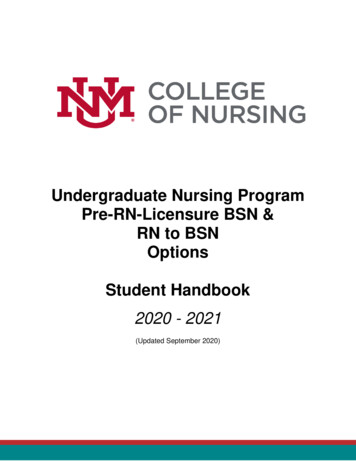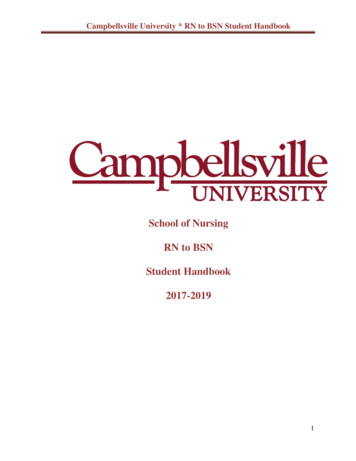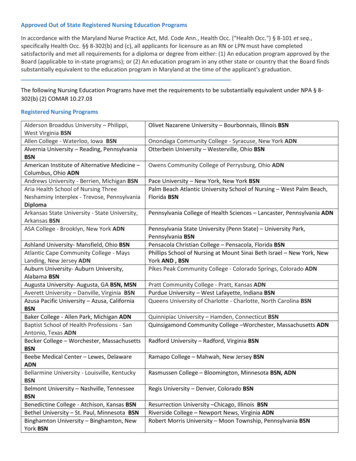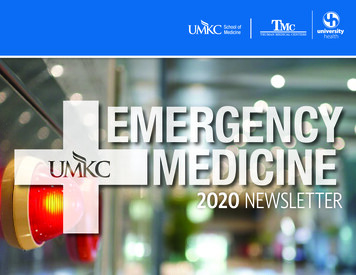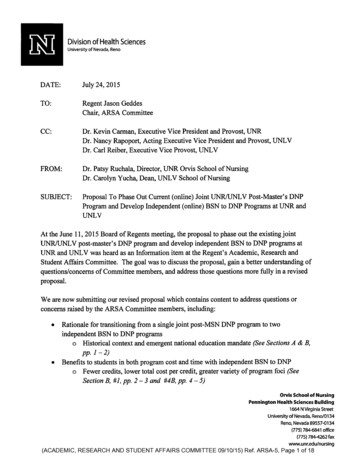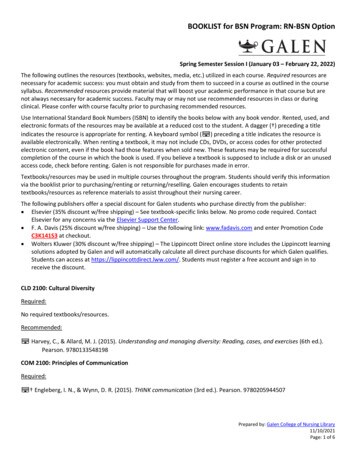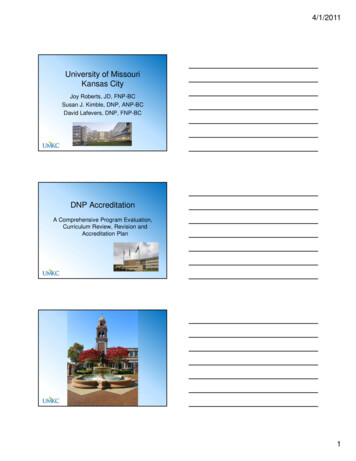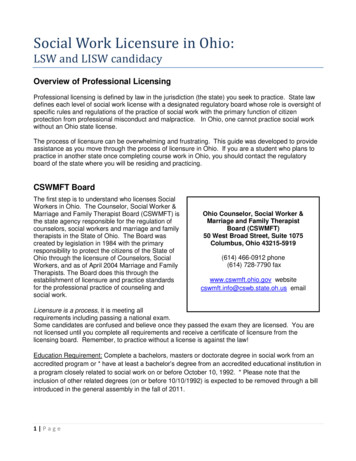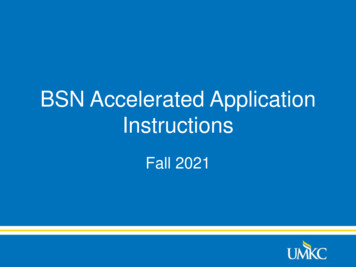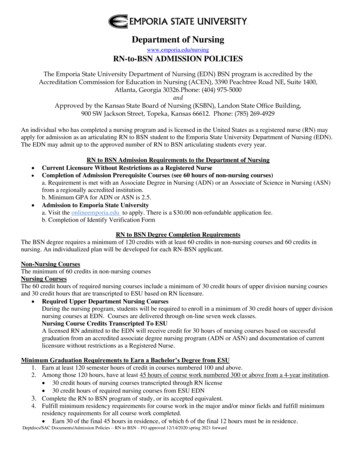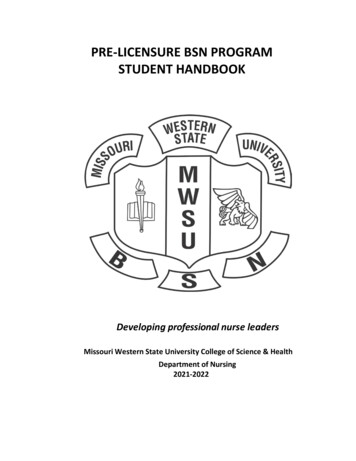
Transcription
PRE-LICENSURE BSN PROGRAMSTUDENT HANDBOOKDeveloping professional nurse leadersMissouri Western State University College of Science & HealthDepartment of Nursing2021-2022
Department of NursingMurphy Hall 309Phone 816-271-4415Additional Nursing Program information may be located at:www.missouriwestern.edu/nursing/1
WELCOMEWelcome to Missouri Western State University’s BSN Pre-licensure Program. This studenthandbook has been developed to assist you in successfully completing your baccalaureate degreein nursing at Missouri Western State University. You are responsible for reading the materialcarefully and discussing any questions you might have with a faculty member or Pre-licensureProgram Coordinator. You are responsible for complying with the policies as stated in theMissouri Western State University Pre-licensure BSN Student Handbook and specific coursesyllabi.Nursing Students are expected to read the regulations and policies in the UniversityUndergraduate Catalog, University Student Handbook, and BSN Student Handbook and toconform to them. It is the student's responsibility for knowing and abiding by the regulationsand policies, and for meeting the requirements for a nursing degree.In keeping with the requirements of Title IX of the Education Amendments Act of 1972 inregard to sex discrimination, Section 504 of the Rehabilitation Act of 1973 in regard to disabilitydiscrimination and the Age Discrimination Act of 1975 as to age discrimination, as well as otherapplicable federal and state laws and regulations as they pertain to discrimination in the areas ofage, race, creed, color, religion, sex, national origin, and the disabled, Missouri Western StateUniversity follows a policy of nondiscrimination in the aforementioned areas in regard to allemployment practices and to the awarding of student financial aid as well as recruitment,admission, housing, placement, and retention of students. The Title IX compliance andAffirmative Action Officer is the Director of Human Resources. The section 504-ADACoordinator is the Accessibility Resource Center Coordinator.2
TABLE OF CONTENTSDepartment of Nursing Info . .Welcome .12Nursing Mission and Philosophy . . 4Program Objectives .6Nursing Course Description . 10Faculty . 10Student Nurses Code of Conduct .1011Standards-Based Nursing Practice Academic Advisement . . 11Academic Honesty .11Attendance. .12Class/Clinical Schedule. 1212Clinical Behavior . .Academic Advisement . 13Communication . .14 with Clinical Agency Requirements.Compliance13Computer Literacy 1314Confidentiality 13Conduct Report 14BLS Basic Life Support 14Criminal Background Disclosure . 14Drug Testing .15CriminalBackgroundDisclosure . .Immunization and Health Insurance 16Personal 16Accountability for Risk Management 1617Professional Appearance .Social Media Policy .18Videotaping/Audio Recording .18Conferences/Events . 18Student Nurses Association . .18Sigma Theta Tau International Honor SocietyOmicron Nu Chapter 1917Scholarships and Financial Aid . 19Academic Regulations .20Grading Scale 20Grade Appeal Process .20Student Compliant/Concern .2121Formal Complaint .Leave of Absence 21Remediation .22Conditional Admission .22Nursing Progression Policies .22Progression Policy . 22Nursing Academic Probation Policy 23Dismissal Policy . 23Student Appeal of Recommendation for24Dismissal . .Readmission Policy . 24Testing Student Input/Program Evaluation Nursing Pinning Ceremony/White Coat Ceremony .2525Composite Class Picture .25Graduation Requirements Professional Licensure . .Management of Unprofessional or Unsafe Clinical Behavior .Policy Statement Regarding the Impaired Nursing Student Project28Concert/SNOC Canvas Page .Acknowledgement of Student Handbook .25252627282825193
Missouri Western State UniversityCollege of Science & HealthDepartment of NursingDeveloping professional nurse leadersMission StatementThe Missouri Western State University Department of Nursing is committed to the development ofstudents as individuals and leaders striving for excellence in inter-professional practice and thepromotion of healthy communities.Nursing PhilosophyAs an integral part of Missouri Western State University, the Department of Nursing supports themission, goals and policies of the University and the College of Science & Health. To master thediscipline of nursing and the increasingly complex knowledge, skills and attitudes required todeliver safe, quality care, a broad-based baccalaureate education including theoretical and appliedlearning are essential for generalist nursing education. Graduate education develops nurses foradvanced nursing practice roles. Recognizing the complexity of organizations, financing anddelivery of health care, the faculty are committed to supporting ongoing program/curricularevaluation and adaptation to meet the demands of the evolving health care system.The faculty believe that professional nursing practice is based upon the integration of the conceptsrelated to person, health, environment and nursing. Systems thinking guides the integration of theseconcepts into the nursing process to promote a holistic nursing care.PersonThe person is viewed as a unique being with intrinsic worth and dignity, whose wholeness is morethan the sum of his/her biophysical, psychosocial, cognitive, and social components. A person is acomplex open system who is in constant interaction with an internal and external environment.The person or designee is able to choose among alternative actions; set goals; make decisionsbased on perceptions, values, and needs. Diversity among persons is valued and respectedProfessional nurses respect the right of self-determination in making informed health caredecisions.HealthHealth is a dynamic holistic process in which individuals and/or groups interact with, biophysical,psychosocial, cognitive and social stimuli in order to achieve maximum potential. All individuals,families, groups, organizations and communities have the potential for both health and illness. Thegoal of nursing is to promote health, prevent illness, support disease management, improve qualityof life and support end-of-life decisions and care.EnvironmentThe environment is the aggregate of conditions which influence individuals, families, groups,organizations and communities. The health care environment varies from basic to complex andhighly technological. Nurses manage, monitor and manipulate the environment to foster health and4
promote safe, quality care. Nurses use informatics to support decision-making and improveoutcomes.Nursing“Nursing is the protection, promotion, and optimization of health and abilities, prevention of illnessand injury, facilitation of healing, alleviation of suffering through the diagnosis and treatment ofhuman response, and advocacy in the care of individuals, families, groups, communities, andpopulations.” (ANA Nursing Scope and Standards of Practice, 2015, p. 1).Standards-based practice underpins the implementation of the nursing process and is focused onmaintaining, restoring or promoting optimal health. Application of the nursing process requirescritical thinking, nursing judgments and competent nursing actions. The nursing process isimplemented through a collaborative relationship that involves interpersonal communication,mutually defined goals and desired outcomes. Professional nursing integrates multiple roleexpectations including leader, provider, designer, manager and coordinator of care. Theprofessional nurse promotes, participates in and uses research as a part of a commitment to highquality care and evidence-based practice.Nursing is an integral part of the inter-professional health care system which has the responsibilityto provide accessible, cost-effective, safe, quality care. As such, professional nurses must possesseffective organizational and teamwork skills; strong communication skills; a service orientation; anethic of professional and social responsibility; cost awareness and accountability for clinicaloutcomes; commitment to continuous improvement of health care and competency in populationbased care.In addition, the faculty holds the following beliefs related to baccalaureate education ofstudent nurses:The faculty are committed to creating and sustaining reciprocal partnerships with a variety ofclinical practice settings wherein mutually beneficial relationships support both student clinicallearning experiences and benefit the delivery setting.Learning is a life-long process of developing individual potential through a spirit of inquiry andself-motivation. Learning involves cognitive, affective and psychomotor components anddevelopment of critical and creative thinking. The learner is accountable for his/her learning andis expected to demonstrate responsibility for independence and self-direction, building upon priorlearning.Faculty have accountability for facilitating student learning by developing, implementing andevaluating quality learning experiences based on current research and practice. Faculty holdstudents accountable for prior learning.Approved 3/2002Revised 12/2007Reaffirmed 12/2009Revised 10/2011Revised 11/2015Revised 04/2016Revised 04/2017Revised 03/2018Revised 10/2018Revised 9/20205
Missouri Western State UniversityCollege of Science & HealthDepartment of NursingBSN Program ObjectivesThe BSN curriculum at MWSU is grounded in a systems approach to standards-based care across the health/illness continuum. The BSNcurriculum incorporates concepts of safety and quality, evidence-based practice, communication and collaboration, patient-centered care,psychomotor skills, critical thinking, theory, technology and informatics, and environments of care in order to prepare competent, professionalnurses. Students will demonstrate competence in the following objectives:Program ObjectivesContent Focus1. Demonstratesstandards-basedprofessional practice.1st SemesterIntroduction toProfessional Roles &Responsibilities acrossthe Health / IllnessContinuum forIndividuals & FamiliesComprehends theinfluence of professionalstandards on nursingpractice and health caredelivery.2. Uses clinical reasoning Demonstrates clinicaland clinical judgement reasoning and clinicalin decision making.judgement in decisionmaking.2nd SemesterProvider of Care forIndividuals & FamiliesAcross the Health/IllnessContinuumApplies professional,ethical, and legalstandards; relatesregulatory andaccreditation standards.Applies clinical reasoningand clinical judgement.63rd SemesterProvider andCoordinator of Care forIndividuals, Families,Groups and Populationsin complex careenvironments Across theHealth/IllnessContinuumIncorporates professional,ethical, legal, regulatory,and accreditationstandardsIntegrates clinicalreasoning and clinicaljudgement.4th SemesterDesigner / Manager /Coordinator of Care forIndividuals, Families,Groups, Communities, &Populations across theHealth/IllnessContinuumDemonstrates andadvocates for standardsbased professionalpractice.Uses clinical reasoningand clinical judgement toanticipate a variety ofconsequences.
3rd SemesterProvider andCoordinator of Care forIndividuals, Families,Groups and Populationsin complex careenvironments Across theHealth/IllnessContinuumRecognizes and usesEstablishes and maintains Adapts effectiveeffective interpersonal,effective interpersonal,interpersonal, therapeutic,therapeutic, professional,therapeutic, professional,professional,organizational, written and organizational, written and organizational, written andelectronic communication. electronic communication. electronic communicationto complex practiceenvironments.Adapts effectiveinterpersonal, therapeuticprofessional,organizational, written andelectronic communicationas designer, manager,coordinator of care.4. Assesses health statusand health potential.Demonstrates holisticassessment skills, focusingon the individual andfamily.5. Performs, teaches,delegates, andsupervisespsychomotor skillswith safety andcompetency.6. Integrates strategies forhealth promotion, riskreduction, anddisease prevention forquality improvementSafely performs selectedpsychomotor skills.Program ObjectivesContent Focus3. Demonstrates effectivecommunication.1st SemesterIntroduction toProfessional Roles &Responsibilities acrossthe Health / IllnessContinuum forIndividuals & FamiliesPerforms and reinforceshealth promotion, riskreduction, and diseaseprevention strategies toinclude quality2nd SemesterProvider of Care forIndividuals & FamiliesAcross the Health/IllnessContinuum4th SemesterDesigner / Manager /Coordinator of Care forIndividuals, Families,Groups, Communities, &Populations across theHealth/IllnessContinuumDemonstrates clinicalreasoning and judgementin the systematic, holistic,and focused patientassessmentCompetently performs andteaches selectedpsychomotor skills.Demonstrates clinicalreasoning and judgementin the systematic, holistic,and focused patientassessmentCompetently performs andteaches complexpsychomotor skills.Demonstrates clinicalreasoning and judgementin the systematic, holistic,and focused assessment.Incorporates strategies forhealth promotion, riskreduction and diseaseprevention for qualityimprovement processes.Implements strategies forhealth promotion, riskreduction and diseaseprevention for qualityimprovement processes.Designs strategies forhealth promotion, riskreduction and diseaseprevention for qualityimprovement processes.7Performs, teaches,delegates, and supervisespsychomotor skills withsafety and competency.
Program ObjectivesContent Focus1st SemesterIntroduction toProfessional Roles &Responsibilities acrossthe Health / IllnessContinuum forIndividuals & Familiesprocesses.7. Provides patientcentered nursing care.improvement processes.Recognizes the nurses’role in the provision ofpatient-centered care.Recognizes informationand technology that can beused to communicate,manage knowledge,mitigate error and supportdecision making.8. Uses information andtechnology tocommunicate, manageknowledge, mitigate errorand support decisionmaking.9. CollaboratesIdentifies the role of theeffectively as a member of nurse as an effectivethe inter-professional team member of the interprofessional team2nd SemesterProvider of Care forIndividuals & FamiliesAcross the Health/IllnessContinuum3rd SemesterProvider andCoordinator of Care forIndividuals, Families,Groups and Populationsin complex careenvironments Across theHealth/IllnessContinuum4th SemesterDesigner / Manager /Coordinator of Care forIndividuals, Families,Groups, Communities, &Populations across theHealth/IllnessContinuumPlans, provides andevaluates patient-centerednursing care.Effectively usesinformation andtechnology tocommunicate, manageknowledge, mitigate errorand support decisionmaking.Plans, provides andevaluates patient-centerednursing care.Integrates the use ofinformation andtechnology tocommunicate, manageknowledge, mitigate errorand support decisionmaking.Designs, manages andcoordinates patientcentered nursing care.Evaluates the use ofinformation andtechnology tocommunicate, manageknowledge, mitigate errorand support decisionmaking.Collaborates with othermembers of the interprofessional team.Collaborates with othermembers of the interprofessional team in thecoordination of care.Collaborates effectively asa member and leader ofthe inter-professionalteam.8
1st SemesterIntroduction toProfessional Roles &Responsibilities acrossthe Health / IllnessContinuum forIndividuals & Families2nd SemesterProvider of Care forIndividuals & FamiliesAcross the Health/IllnessContinuum3rd SemesterProvider andCoordinator of Care forIndividuals, Families,Groups and Populationsin complex careenvironments Across theHealth/IllnessContinuum4th SemesterDesigner / Manager /Coordinator of Care forIndividuals, Families,Groups, Communities, &Populations across theHealth/IllnessContinuum10. Recognizes the impactof health care policy,finance and regulatoryenvironments on theprovision of patient care.Demonstrates basicknowledge of health carepolicy and regulatoryenvironments.Demonstrates basicknowledge of the effect ofhealth care policy andregulatory environmentson vulnerable populations.Evaluates the effect ofhealth care policy, financeand regulatoryenvironments in carecoordination.Evaluates the effect ofhealth care policy, financeand regulatoryenvironments as designer,manager and coordinatorof care.11. Uses theory andevidence-based knowledgefrom nursing and thesciences in the provisionof care.Recognizes theory andevidence-based practicesthat contribute to qualitynursing care.Identifies theory andAppraises theory andevidence-based knowledge evidence-based knowledgefrom nursing research.from nursing and thesciences.Uses theory and evidencebased knowledge fromnursing and the sciences inthe provision of care.Program ObjectivesContent Focus9
Nursing Course DescriptionsThe descriptions for all courses required for the completion of the nursing degree are in the MissouriWestern State University Undergraduate Catalog. They can also be found online athttps://www.missouriwestern.edu/catalog/ .FacultyMembers of the faculty are available to students for consultation concerning curriculum and many othermatters during office hours and by appointment. Nursing faculty serve as advisors to students enrolled inthe nursing major. Nursing students are encouraged to have regular contact with their faculty advisorregarding their progress in the nursing program. A complete roster of the nursing faculty and theireducational qualifications is available online at ff/ .Faculty may be contacted by emailing or by calling the Department of Nursing administrative assistantat (816) 271-4415; fax (816) 271-5849. Faculty contact information is available on the Department ofNursing website. The Department of Nursing is located in Murphy Hall, Room 309.Student Nurse’s Code of ConductStudent nurses are bound by the American Nurses Association Code of Ethics. A code of ethics is anintegral part of nursing and serves three major purposes: 1) outlines the ethical obligations and duties ofeach nurse; 2) provides a nonnegotiable standard; 3) makes a commitment to individuals, families,colleagues, the profession, and society. Therefore, the Department of Nursing has adopted the followingCode of Conduct to which all nursing students will be held accountable. The Code of Conduct is derivedfrom the principles in the ANA Code of Ethics and adapted from the National Student NursesAssociation.1. Academic honesty is required in all academic endeavors. Violations of academic honesty includeany instance of plagiarism, cheating, seeking credit for another’s work, falsifying documents oracademic records, or any other fraudulent activity.2. Advocate for the rights of all clients.3. Maintain confidentiality of clinical health information and information from health care agencies.4. Act to ensure the safety of self, clients, and others.5. Provide quality care for the client in a timely, compassionate, and professional manner.6. Communicate in a respectful, truthful, timely, and accurate manner.7. Promote the highest level of moral and ethical principles and accept accountability for all actions.8. Promote excellence in nursing by encouraging lifelong learning and professional development.9. Treat others with respect and promote an environment that respects human rights, values, andcultural and spiritual beliefs.10. Collaborate with the academic faculty and/or clinical staff to enhance learning and practiceoutcomes.11. Refrain from performing any technique or procedure for which the student has not beenadequately educated.10
12. Refrain from any deliberate action or omission in the academic or clinical setting that creates andunnecessary risk to the client, self, or others.13. Abstain from the use of alcoholic beverages or any substance that impairs judgment in theacademic or clinical setting.14. Strive to achieve and maintain an optimal level of personal health.15. Uphold school policies and regulations related to academic and clinical performance, reservingthe right to appeal according to university policy.Standards-Based Nursing PracticeAll nursing students are held accountable for the same standards and ethics of practice as that of aregistered professional nurse. The American Nurses Association Code of Ethics for Nurses providesguidance for conduct and relationships in carrying out nursing responsibilities consistent with theethical obligations of the profession and quality of nursing care. ANA Scope and Standards of NursingPractice are published standards of care established by the nursing profession and are continuouslyupdated. They serve as guidelines for nursing practice to ensure proper, consistent, and high-qualitynursing care to all members of society. In addition, the AACN Baccalaureate Essentials, QSENCompetencies and agency-specific policies and procedures serve as standards for the BSN program.The Missouri Nurse Practice Act defines nursing practice and establishes standards for nurses in thestate. It is the most definitive legal statute or legislative act regulating nursing practice. The NursePractice Act provides a framework for the court on which to base decisions when determining whethera nurse has breached a standard of care. Students are required to purchase the ANA Code of Ethics andthe ANA Scope and Standards of Nursing Practice and to download the Missouri Nurse Practice Actthrough www.pr.mo.gov/nursing.asp. If a student has questions about legal scope of practice, licensingrequirements, or nursing education, they are encouraged to contact the:Missouri State Board of Nursing 3605 Missouri Boulevard, P.O. Box 656, Jefferson City, MO 65102Website: www.pr.mo.gov/nursing.aspAcademic AdvisementStudents will be assigned a nursing faculty advisor. The student and the advisor will complete a majordeclaration form after acceptance into the program. Students are accountable for understanding andcompleting degree requirements as specified on the major declaration form. Any substitutions toprogram requirements must be approved by the advisor and the Chairperson. Students must meet withtheir advisor each semester during the enrollment period to plan their course of study.Academic HonestyHonesty in the classroom or clinical area is required. Cheating, plagiarism, or knowingly furnishing falseinformation is unprofessional behavior and may result in dismissal from the program. See the MWSUStudent Handbook .11
AttendanceTimely, regular attendance and preparation for class/clinical is an essential part of professional behaviorand academic work. The responsibility for attendance rests with the student. Faculty expect students toattend all scheduled classes of the courses in which they are enrolled. Students must be present during theentire class period to receive credit for quizzes or classroom assignments. Students who must miss classdue to a university sanctioned event or who are acting as a representative of the university or departmentmust communicate with their instructors as soon as they are aware of a need to miss class/clinical.Determinations related to make-up coursework or examinations will be based on academic standing,reason for missed coursework and feasibility to obtain required course content and/or clinical experiences.Faculty “are not required to prepare or give a make-up test. Consideration will be given to students in thecase of genuine (documented) illness, emergency, or when acting as a representative of the University”(See the MWSU Full Course Syllabus Statement regarding attendance). Any student who is absent forclinical or a class in which an exam is scheduled will be required to meet with the lead instructor for thecourse. A summary of this meeting will be forwarded by the lead instructor to the BSN Pre-licensureCoordinator, who will track absences throughout the program. Any student who misses 2 or more clinicaldays or classes in which an exam is scheduled during the nursing program will be required to meet with theBSN pre-licensure program coordinator and a conduct report will be completed. A pattern of clinical orexam day absences may result in course failure and/or program dismissal (see Management ofUnsafe/Unprofessional behavior Policy).Class/Clinical ScheduleNursing students must take into consideration the fact that nursing coursework demands nontraditionalclass and clinical hours when entering the nursing program. Students should be aware that specialarrangements will be required for child care, work commitments, transportation, and extracurricularactivities. Nursing education is a full time, challenging commitment. It is recommended that studentsshould limit their work commitments to no more than 24 hours per week. Information on financialassistance is available from the Office of Financial Aid. NOTE: Students are responsible for their owntransportation to clinical sites.Clinical BehaviorStudents in the nursing program at Missouri Western State University are expected to practice accordingto the standards set by the profession. ANA Scope and Standards of Nursing Practice and the AmericanNurses Association Code of Ethics for Nurses document these expectations. Students should be awarethat a behavior that deviates significantly from these standards and that is unsafe, illegal, orunprofessional may result in a recommendation for dismissal from the program. While a single incidentmay be serious enough to warrant an immediate recommendation for dismissal, a pattern of less seriousunprofessional behaviors will also result in a recommendation for dismissal.If a student’s behavior/performance is believed to be an immediate and severe threat to patient or publicsafety and welfare, he/she may be removed from the clinical area, followed by a writtenrecommendation for dismissal from the clinical course. Dismissal from the nursing program may berecommended (See Management of Unprofessional or Unsafe Behavior).12
CommunicationFaculty in the nursing program value open, direct, honest, and respectful communication. Students areexpected to communicate openly, honestly, and respectfully with peers, faculty, health care agency staff,patients, and families. If concerns with a course arise, the student is expected to discuss these concernsopenly and honestly with the appropriate faculty member. The student may also seek guidance fromtheir academic advisor and/or the BSN Pre-licensure Coordinator, if necessary.Compliance with Clinical Agency RequirementsStudents must complete all pre-admission and annual requirements as described in this handbook andoutlined in the Clinical Compliance Checklist (found in the Student Nursing Orientation and ComplianceCanvas page) before being allowed in clinical areas. Students will also need to sign the Release ofInformation form which will allow the Department of Nursing to release information to clinical agencies.Failure on the part of the student to satisfactorily complete these requirements will result in the studentbeing denied placement in the clinical agency and may result in course failure. Note: clinical agencyrequirements may change after the student begins the nursing program. It is expected that students willremain compliant with all compliance requirements throughout the duration of the nursing program.Computer LiteracyStudents must have a MWSU email account and have basic computer skills including the ability to; typeand edit a Word document, attach a document within an email, scan and upload documents andcomplete class assignments via the online learning management system.ConfidentialityA strict ethical and legal (HIPAA) obligation exists for nurses to respect client confidentiality and notto reveal information without the client’s consent. Confidentiality of medical information on patientsand information regarding the conduct of health care agency personnel must be honored. In order topractice in the clinical environment, students are required to sign a confidentiality statement for theuniversity to hold privileged information in confidence. Violation of confidentiality may be reflected incourse grade or may result in dismissal from the program (see Dismissal Policy.)Health Information Portability and Accountability ActThe Health Information Portability and Accountability Act of 1996 (HIPAA) establishedstandards for health care providers in the protection of patient health information. Privatepatient information must be kept confidential and can only be disclosed or used for specificpurposes related to an individual’s care. In order to practice in the clinical environment,students are required to sign a Confidentiality Statement.13
Conduct ReportStudent behavior that is not consistent with professional standards (ANA Scope and Standards ofNursing Practice, ANA Code of Ethics, MWSU Student Code of Conduct, Nurse Practice Act, andHIPAA) will be reflected in evaluation/grading and may be grounds for dismissal from the program.Conduct Reports should be initiated anytime the instructor deems it appropriate to document a student’sperformance in writing for their permanent file. This serves as a tracking mechanism for patterns ofbehavior as w
Nursing Students are expected to read the regulations and policies in the University Undergraduate Catalog, University Student Handbook, and BSN Student Handbook and to conform to them. It is the student's responsibility for knowing and abiding by the regulations and policies, and for meetin
